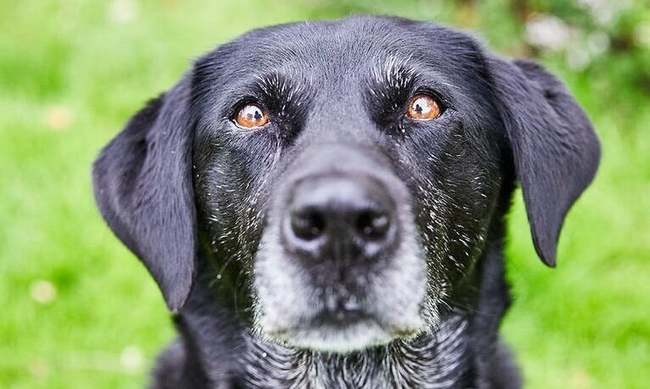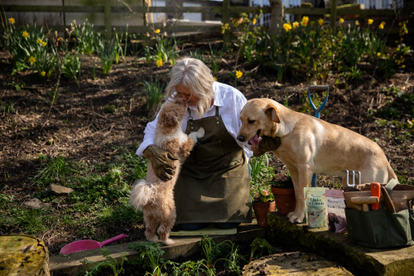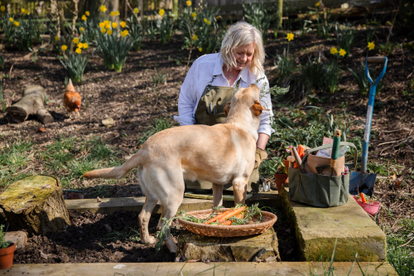Best food for senior dogs

It is so important that we support our dogs through every life stage, from puppy-hood to old age. As a dog ages and becomes “senior” we need to understand how their body is changing and how best we can help them feel their best, so we asked our vet to answer some questions we had about our older dogs:
When does a dog officially become a “senior”?
You might be wondering when a dog is classified as senior, they don’t get a bus pass or go in to retirement like humans, so it’s not always obvious…
Senior: A dog in the second half of its predicted life expectancy can be considered as ‘senior’. Most will still be healthy but beginning to experience signs of ageing.
Geriatric: A dog at the older end of the ageing spectrum, perhaps from 80-90% of their life expectancy, they may well be experiencing more health related issues.
It’s important to note that different sized breeds tend to age differently. Large breeds often age faster and have shorter lifespans.
What changes might occur in my ageing dog?
As dogs age they will naturally experience changes throughout their body systems: Typical changes will be seen in the following areas:
Digestive system – as dogs age they can be more prone to conditions such as inflammatory bowel disease and colitis and therefore highly digestible natural diets are often best, to make sure they get the most out of their food. Some older dogs can be prone to constipation – so it’s important to chose a food with a good balance of quality fibre, like that from fruit & vegetables. A wet food, rather than kibble, can be beneficial for these dogs and kinder to those suffering dental pain.
Brain /nervous system – many older dogs can show signs of senile behaviour. However, antioxidants have been shown to be useful in slowing disease progression. Antioxidants have also been shown to aid in the fight against cancer – cancer being more prevalent in older dogs.
Musculoskeletal system – with age dogs can suffer from osteoarthritis. Arthritis is inflammation within the joints and Omega 3 fatty acids have been shown to be beneficial in reducing this inflammation and therefore pain. With a loss of muscle comes weakness and loss of ease of motion – so it’s important to provide adequate high quality protein to maintain muscle mass as a well dog ages – special consideration of the protein level will be needed if there is an existing kidney disease and the level may need to be lowered.
Does my dog need a special diet now they’re older?
Diet greatly affects health and you’re never too old to make changes. Unless your dog has specific health issues, a special diet isn’t necessary but choosing species appropriate bioavailable food to support their less efficient body systems is really important. Here are some tips when choosing a diet for your much loved faithful friend:
- Does it have good quality protein?
- Is it easily digestible i.e. natural and not highly processed?
- Does it provide a balanced fibre source to support digestion?
- Will it provide fatty acids, such as a good quality fish oil, to support joint health?
- Is it a high source of natural antioxidants, vitamin and minerals?
Does my dog need less protein now that they’re old?
This is a common misconception – older dogs need a good supply of quality protein to maintain muscle mass as they age and to support the optimal immune and organ function. However, the type of protein is vital for bioavailability, so minimally processed protein is the best.
Previously it was believed that high protein diets could lead to kidney disease in dogs but this has been shown not to be the case. We now know that in the well senior dog, one without pre-existing kidney disease, high protein food does not increase the likelihood of that dog developing kidney disease.
My dog seems fussy in older age, how do I keep them eating?
If a dog goes off their food it’s important to get them vet checked and make sure there are no medical reasons for this. If no health issues are discovered then try to get them in a good routine, feeding at set times, not leaving the food down for too long at a time (1/2hr each offering), use a variety of our recipes to keep interest up and warm the food. Bone broth is also great as an elderly dogs appetite changes. Also be mindful that if their body condition score is still good, then they might just need a smaller portion nowadays.
Does my dog need the same number of calories as when they were younger?
As dogs age their metabolic rate will slow and this coupled with a decreased activity with age, results in a lower energy requirement. In older dogs we need to consider this so that we do not overfeed and create overweight or obese dogs – this would be detrimental to health and worsen conditions such as arthritis etc.
Do I need to consider the fat content of my old dog’s food?
Higher fat foods will be more calorie dense – so, as above, if the older dog is tending to put weight on, it can be useful to lower the fat content of their food as well as considering portion size. As dogs age they can be more prone to pancreatitis and these dogs will benefit from lower fat foods. For well dogs with less of an appetite, a more moderate fat level can make the food more appealing and help them to maintain their condition.
How can Different Dog help?
Different Dog food is cooked using high quality protein that is highly digestible, with a good balance of fibre, making it a great option for the senior dog. The variety in our recipes mean that there is a choice of fat levels, and we can tailor your box to your dog’s individual needs*. All our ingredients and superfoods are of the highest quality, packed with essential fatty acids and antioxidants, which are beneficial for the older dog.
If you have any other questions for our vet, or would like to chat anything through with our team you can call us on 01743 384562 or email us feedme@differentdog.com



Join The Pack
Receive exclusive offers, tips and tricks from our vet.